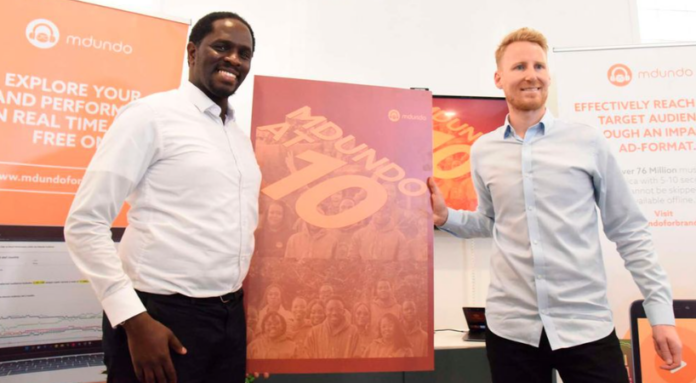Mdundo, a pan-African music streaming platform based in Nairobi, has become a multi-million business since its establishment in Kenya in 2013. The company transformed from selling music vouchers to offering a free music streaming service, attracting over 20.3 million monthly active users across Africa.
The company, founded by Martin Nielsen and Francis Amisi (Frasha) of the Kenyan music trio P-Unit, offers a unique model of free music downloads that caters to a market that is not yet stream-ready and is looking for ways to access music.
According to Mdundo’s Chief Executive and co-founder , Martin Nielsen, the majority of their audience uses low-end devices and does not have high-end smartphones, with only 50 to 100 million devices in Africa capable of streaming music.
Furthermore, many people cannot afford the data required for streaming. Therefore, Mdundo has created a platform that allows musicians to earn royalties from this market, catering to everyone from Uber drivers and students to askaris.
The company currently has over 100,000 musicians with accounts on the platform, with Kenya alone boasting over 20,000 musicians. Mdundo has seen steady growth in revenue.
Despite facing challenges such as high levels of piracy and copyright infringement, Mdundo has been able to thrive in the African music industry.
One of the ways the company is dealing with this challenge is by providing a platform that allows artists to upload or release their music on their site. People can then download songs or DJ mixes for free from the website, and the revenue from the ads on the website is shared with the musician.
This means that even when users download the song for free from Mdundo, the musician still makes money from it.
The typical consumer of music on Mdundo is someone who does not own a smartphone but has an internet connection, with the other half using low-end smartphones. Most of these customers are in the low-income bracket, earning less than Sh30,000 a month.
The music they consume is mainly local, with Kikuyu gospel and Kamba music being popular. These customers are often unable to find this music on other platforms, making Mdundo their go-to source.
Mdundo’s business model is a commercial success due to the company’s ability to reach a group of customers who cannot be reached through any other medium. Advertisers can use the platform to reach customers who do not read newspapers, listen to the radio, or use social media.
Nielsen believes that the key to Mdundo’s success is the fact that the company is helping advertisers reach customers who cannot be reached through other channels, while also allowing artists to reach fans who they cannot reach through other platforms.
Martin Nielsen notes that the company has been successful by focusing on income from the mass market, with 48% of its customers earning less than KSh25,000 a month.
These customers tend to have lower data consumption rates and may not be as active on social media as more affluent users.
Nielsen states that “the mass market does not have many options. Most of the services and apps are focused on the same customers with good smartphones, fast internet and unlimited Wi-Fi. But Kenya consists of a good number of people who don’t have this access, whom we call the ‘skiza market’.”
While the company offers a free service in Kenya, it provides a premium service in Tanzania, Ghana, and Nigeria in partnership with telecom providers.
The premium service allows customers to subscribe to a bundle and access DJ mixes, while the free service exposes users to advertisements. However, the advertising business remains the primary revenue earner for Mdundo.
The company’s focus on local content has been a key driver of its growth. Mdundo offers music from a range of genres, including gospel, Bongo, native language music, rap, Kaswida in Tanzania, and Amapiano.
Approximately 80% of content listened and downloaded is from Africa. Nigeria is the largest market, with 22% of monthly active users, followed by Tanzania (13%), Kenya (11%), and Ghana (8%).
The platform has grown from 50 artists to over 100,000 musicians across the continent, with approximately 20,000 artists in Kenya alone.
Artists have access to a dashboard where they can sign up, upload and manage their music catalogue directly from their devices, and withdraw royalties directly through mobile money services.
The company’s focus on mass market and local content has seen it pay approximately KSh100 million over the last 10 years, with plans to pay a similar amount in the year to June 2023.
All revenue from advertisers and premium products is shared 50-50 percent between the artists and the company. Nielsen notes that this revenue sharing model is the result of the company’s steep growth across the continent, both in terms of users, musicians, and revenues.
In September 2020, Mdundo was listed on the Nasdaq First North stock exchange in Copenhagen. The company is now aiming to attract 50 million monthly active users.
Despite being headquartered in Nairobi, the company did not consider the Nairobi Securities Exchange (NSE) for its listing due to low liquidity.
Nielsen notes that “the company we are listed on is a growth exchange for growth and smaller companies. I am also donnish and it’s easier to communicate with the market. There have not also been too many listings at NSE recently and so liquidity and activity has been quite limited and that, of course, affect us as well.”









